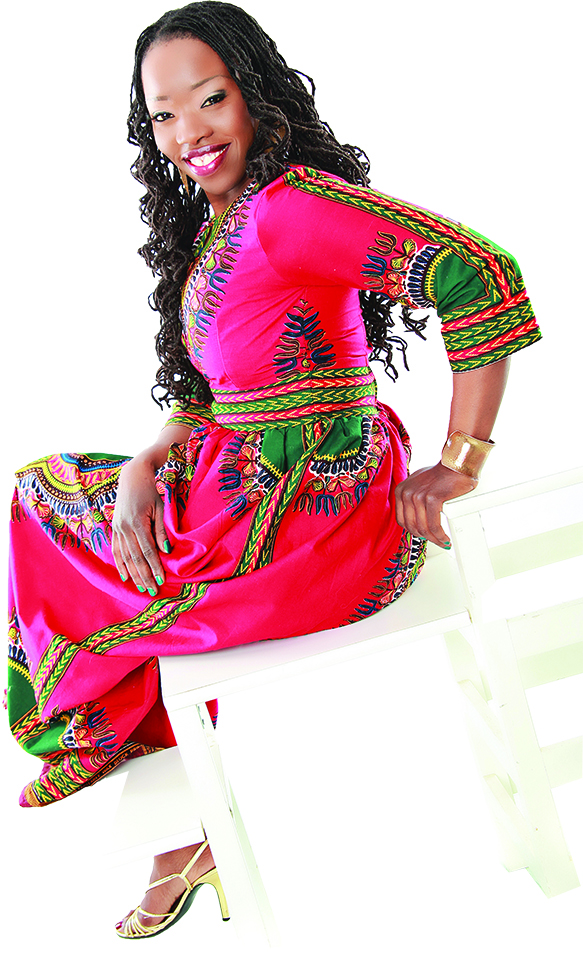In my travels, I have come to understand that as women of African descent, whether you are in England, Brazil, St. Maarten, South Africa or in the United States, we face many of the same challenges. Most of us are dealing with unrealistic European standards of beauty imposed upon us from the time we are born. This, combined with the expectations of our parents and community, leaves us feeling like we always have something to prove.
This used to be me. Born in Uganda, my upbringing as an African in America shaped my sense of identity and self-worth. My ‘Africanness’ in a world where light skin and long, straight hair were preferred, was almost taboo.
In elementary school, I detested my first name, Julian, because in America, it was considered a boy’s name. To add what I thought was insult to injury, my last name, Kiganda, was extremely difficult for Americans to pronounce. So it was butchered often. Because my mother kept mine and my four sisters’ hair short, I was asked more than once by students at school if I was a boy or a girl. Beauty and success to me were not synonymous with being African.
Two major turning points in my life happened to flip this erroneous belief on its head. The first was the opportunity to travel the United States (US) as a member of an all-women’s East African performing arts group called Kayaga of Africa. Showcasing our culture on stages where many in the audience still had a very backward view of Africa was both empowering and life-changing. As American audiences showed appreciation for the beauty and diversity of my culture, so did I.
But I still struggled to reconcile who I was to who I thought I was supposed to be. Then in 2006, my firm won a bid to design an African American slavery museum in Alexandria, Virginia, US. It was a project which would completely change my perspective of African Americans. In public school, very little is taught about slavery or African American history in general. So my real introduction to black history came as a result of designing this museum.
Loading...
I began to understand how Africans were forced to give up their languages, their identities, and their names to take on that of their white slave owners. The atrocities Africans in America suffered were indescribable. That’s when I began to understand my role in bridging the divide between Africa and her diaspora.
Since designing that museum, my work as an artist, author, community activist, teacher and entrepreneur has revolved around bridging the two cultures which have played integral roles in shaping who I am today: a black woman who is proud of my African roots, and comfortable defining beauty and success for myself. I use every opportunity I can to educate my brothers and sisters on both sides of the Atlantic on the fact that we are more alike than we are different: history and current circumstances speak to that.
As an old African proverb states: “If you want to go fast, go alone. If you want to go far, gotogether.”
We need to build bridges that will bring greater collaboration, cultural exchange and opportunity. I believe women play a key role in building those bridges. Thankfully, I’m not the only one.
On a recent trip to Johannesburg in South Africa, while being driven around the city by a Malawian Uber driver, I asked him what he thought of Joyce Banda, his country’s immediate past president and second female head of state in Africa. His answer pleasantly surprised me:
“I think she did a good job. We would have a better world if we had more women as presidents. There is something that God put in women which we men don’t have. Women are multi-taskers and considerate. If you think about it, we live in the wombs of our mothers for nine months. If they can take care of an entire family, they can take care of an entire country.”
You may not aspire to be the next president of your country, but as a woman, you are uniquely equipped to succeed. Just remember, part of your success depends on your willingness to accept and embrace who you are: in all your Africanness. Understand your true value. Don’t be afraid to challenge the status quo. Instead, blaze your own trail and define success for yourself.
– The writer is based in Washington DC and is founder and CEO of Bold & Fearless, a lifestyle brand and online magazine for professional women of Africa and the diaspora.
Loading...
